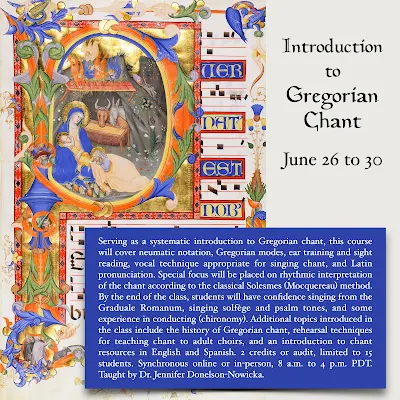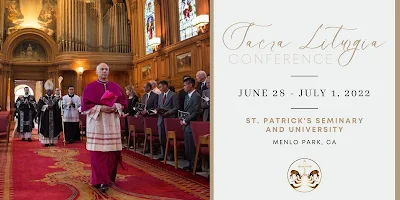We are very grateful to guest contributor Roseanne T Sullivan for this article about a new chair in Sacred Music, named for our publisher, and long-time president of the Church Music Association of America, Dr William P. Mahrt. The chair has been established by His Excellency Salvatore Cordileone, Archbishop of San Francisco, at the archdiocesan seminary and university of St Patrick in Menlo Park, and its first holder is our contributor Dr Jennifer Donelson-Novicka. This post will be followed by a second part with an interview with Archbishop Cordileone.
His Excellency Salvatore Cordileone, Archbishop of San Francisco has created an endowed chair in Sacred Music at St. Patrick’s Seminary and University, which forms clergy for the San Francisco archdiocese and for other dioceses throughout the West and the Pacific Rim. With the establishment of this new William P. Mahrt Chair in Sacred Music, many courses in the history and practice of the Church’s sacred music will be available to seminarians and to others who are interested.
 |
| St Patrick’s Seminary |
The overall quality of music at the seminary liturgies will be enhanced by the musical direction and example of the new holder of the chair, Professor Jennifer Donelson-Nowicka. In her new role as Associate Professor of Music and Director of Sacred Music at the seminary, she will also serve as the director of sacred music, overseeing all the musical activities in the seminary chapel, and accompanying liturgies at the organ, while both developing and directing a schola cantorum, which will sing Gregorian chant (in Latin), chant in English and Spanish, and sacred polyphony.
Here are some quotations from her paper “Emotion, Intellect, and Will: The Fruits of Sacred Music in the Spiritual Life”, which was given on June 29 at the Sacra Liturgia 2022 Conference in San Francisco.
“The Church has long been the greatest patron of beauty, feeding Christ’s sheep. Beauty is food for the soul. The world needs the material charity of the Church, but also Her spiritual charity.”
“It is possible to get to heaven without understanding much of anything about music, thanks be to God. But to willfully cling to ignorance or even an anti-knowledge which prizes ugliness or mediocrity is to choose to be deaf to one mode through which God makes known His glory.”
“Mediocre music, banal music is not spiritually neutral. It has a numbing effect on the soul, feeding the senses with the mere shadow of the glory of God’s love, but never really piquing our interest or helping us see God clearly. ... Bad music is a sort of spiritual junk food—food that looks like food, but makes us fat and lethargic. Musical junk food has no place in the sacred liturgy.”
 |
| Prof. Donelson-Novicka speaking at the Sacra Liturgia conference this past June; to her right are His Eminence Robert Card. Sarah, Archbishop Cordileone, and Fr Mark Doherty, the rector of St Patrick’s Seminary. |
Professor Donelson-Nowicka wrote this to me in an email: “The chair is named after Dr. Mahrt in honor of his decades of devoted service to the cause of sacred music, not only in the Bay Area through his work at Stanford University and with the St. Ann Choir, but also nationally and internationally through his leadership as president of the Church Music Association of America (CMAA), and editorship of the CMAA’s journal Sacred Music.
“His scholarly work highlights, for example, how the Church’s Gregorian chant not only fittingly conveys the texts it adorns, but serves an integral role in the Church’s worship by expressing the nature of the liturgy itself. An Introit is an integral component of the liturgical action, moving the hearts of worshippers to the altar, and the procession to the sanctuary, sounding in a music that likewise moves. The Alleluia, in its profusion of notes on a short text, affords the opportunity for contemplation and meditation which, as the Church points out for example in the General Instruction of the Roman Missal, is a dominant characteristic of the Liturgy of the Word. The Church’s polyphony, too, expresses a particular splendor, reminiscent of the glory of God in His creation.
“All these are insights that Dr. Mahrt has patiently developed in his own work and in the hearts of his listeners and readers. They are the thoughts of a man who takes seriously the worship of God as the center of his life, and who devotes his intellectual energies towards the probing of the gifts the Church gives her children to ‘worship the Father in Spirit and in truth.’
“Inspired by Dr. Mahrt’s work, the mission of the chair is likewise to bring together prayer, worship, theology, beauty, and academic and technical excellence in sacred music.”
Professor Donelson-Nowicka is also organizing an international sacred music conference to be held at St. Patrick’s seminary in November of 2023 celebrating the work of Dr. Mahrt.
The choice of Professor Mahrt is particularly exciting to me because I have been writing for years about his achievement of keeping chant and polyphony alive while it was out of favor. [1] I sang with the St. Ann Choir that he directs at St. Thomas Aquinas Church in Palo Alto for a few years beginning in 2005, and was very impressed when I learned that he had persisted in directing that choir in the singing of Gregorian chant and motets at Sunday Masses, and polyphonic Masses on feast days, in liturgies where that kind of music belongs, even during the long decades when that kind of music was virtually banned in the Church after Vatican II.
 |
| Dr. Mahrt directing the St Ann Choir... |
 |
| and here, showing a large decorated folio with the introit of the choir’s patronal feast. |
Music at the Heart of the Archbishop’s B16 Institute
This exciting innovation is tightly aligned with the goals of the Benedict XVI Institute for Sacred Music and Divine Liturgy, which Archbishop Cordileone founded in 2013.
I’ve also written several articles on Archbishop Cordileone’s initiatives to promote more-reverent liturgies through the Benedict XVI Institute. On January 5, 2014, I was present when Archbishop Cordileone along with Father Samuel Weber, O.S.B., the original director, announced the founding of the new institute. During its “opening night,” the archbishop announced, “The heart of the institute is music.” Among other related goals, he said that he wanted “to reclaim the sacred music that is so much at the heart of our celebration of the Mass.”
To do this, he continued, the institute would promote “what the Church has been asking us to do for a really long time, beginning at the Second Vatican Council” and continuing with “so many documents since, including the current General Instruction on the Roman Missal: Gregorian chant is to have first place in music at Mass.”
 |
| Archbishop Cordileone speaking at the Sacred Liturgia conference. |
After the archbishop’s introduction, Fr. Weber demonstrated that it is easier than generally imagined to train people to sing chant well without much instruction on how to read the chant notation. Rehearsing with a program he had prepared with English chants of his own composition, Fr. Weber prepared the 200 or so people who attended to sing hymns and psalms at Benediction and Vespers of the Epiphany.
As one commenter on Fr. Zuhlsdorf’s blog noted, “Vespers was fantastic, presided over by Abp Cordileone, and cantored by Fr. Weber, chanted in its entirety. Before we went into the Church for vespers, Fr. Weber did a quick tutorial/run-through of the chants for vespers, and unsurprisingly, everyone picked them up quite easily.”
The scope of the activities of the Benedict XVI Institute has widened in the ensuing years. On July 26, 2017, Catholic San Francisco announced that the institute’s name had changed a little, replacing “Liturgy” with “Worship” and that it was expanding its focus from sacred music to include also Catholic art, architecture, and literature under the new executive director, Maggie Gallagher.
Part of the expanded focus is to promote the creation of new works of art and literature and to build community and recognition between Catholic creatives, potential patrons, and other lovers of Catholic sacred arts.
The importance of music to the institute is evidenced by Archbishop Cordileone having named Frank La Rocca to be the institute’s composer in residence. The institute has commissioned several Mass settings so far from La Rocca: the Mass of the Americas, the Requiem for the Homeless, and Missa Sancti Juniperi Serra (in honor of St. Junipero Serra). La Rocca's new Messe Des Malades: Honoring Our Lady Of Lourdes, will premiere in February 2023.
The first Mass setting La Rocca composed for the institute, Mass of the Americas, continues to be performed in more and more cathedrals and churches long after it first premiered December 8, 2018.
Another great indicator that the results of the institute’s initiatives are also spreading into mainstream culture is a new album with a studio recording of the Mass of the Americas by Grammy-winning producer Blanton Alspaugh. After the album was recently released, it quickly rose to the top of the Billboard charts.
The institute also frequently sponsors events where other music, also art, and poetry from talented living creative Catholics is performed. “Our artists need to know we value their work, including a creative genius like Frank La Rocca, but also young artists,” Archbishop Cordileone has said.
The creation of the new Sacred Music chair that is the main topic of this article emphasizes the vital importance of priestly formation in survival of the Church’s heritage of sacred music. It seems to me to be an exciting step forward in achieving the goals of the institute, perfectly in line with the archbishop’s plan from the beginning to foster reverent liturgies.
The ripple effects of this new program may continue to be seen in many places in years to come. The Vatican Council II document Sacrosanctum concilium states, “The treasury of sacred music is to be preserved and cultivated with great care.” Those who benefit from training and the example of music skillfully performed at St. Patrick’s by an expert in expounding and performing the treasury of the Church’s sacred music will in their turn go out to spread the good news to many more places.
 Fr. Pasley has acted as an officer of the board for many years. After first becoming introduced to the beauty of sacred music in the liturgy by Fr. Richard Schuler, of St. Agnes Parish (St. Paul, Minnesota), editor of Sacred Music, he became a loyal member and was identified early on as a leader. As Vice President many years ago, when Fr. Robert Skeris was the Association’s President, he was there, signing the documents for the CMAA’s incorporation in Virginia. He attended the very first Sacred Music Colloquium and has attended nearly all of them in the years since. Eighteen years ago, when Dr. William Mahrt was elected as CMAA board President and Dr. Horst Buchholz as Vice President, Fr. Pasley took the position of Chaplain. He has served faithfully as a spiritual guide and officer ever since.
Fr. Pasley has acted as an officer of the board for many years. After first becoming introduced to the beauty of sacred music in the liturgy by Fr. Richard Schuler, of St. Agnes Parish (St. Paul, Minnesota), editor of Sacred Music, he became a loyal member and was identified early on as a leader. As Vice President many years ago, when Fr. Robert Skeris was the Association’s President, he was there, signing the documents for the CMAA’s incorporation in Virginia. He attended the very first Sacred Music Colloquium and has attended nearly all of them in the years since. Eighteen years ago, when Dr. William Mahrt was elected as CMAA board President and Dr. Horst Buchholz as Vice President, Fr. Pasley took the position of Chaplain. He has served faithfully as a spiritual guide and officer ever since.













.jpg)





















